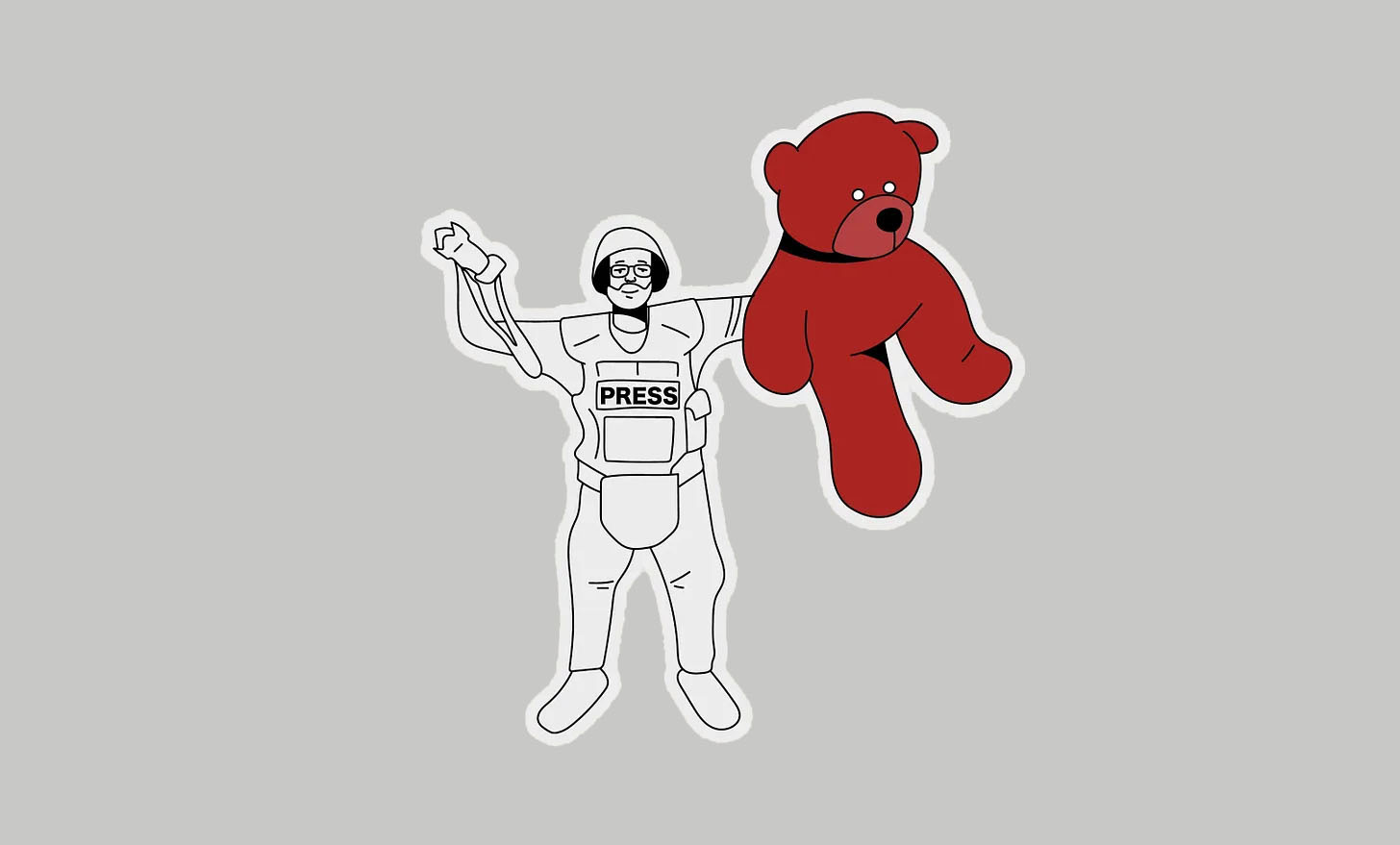Motaz Azaiza turned 25 today. He is no longer a “24-year-old photojournalist from Gaza”, a sentence nested in his Instagram bio and imprinted in our minds forever. Or is it just my mind? Not sure why that particular sentence gets me. Every time I see it on his profile, it’s like a headline in neon staring me down, an alarming collection of letters that haunt me.
Is it because my nephew was born in the same year? Am I tormented by imagining my nephew, a baby I held in my arms when he was smaller than a loaf of bread, having to document a slaughter of his people, friends, neighbors, and family—instead of chugging bears by the seaside?
Another line from Motaz’s Instagram torments me. “My photos traveled the world but my feet couldn’t touch my Homeland. Gaza Strip - Occupied Palestine”. Where do you even begin with that one? Another magnitude of the Israeli government’s human rights violations and unfiltered disdain towards people that they occupy. His photographs are now all over the free world, while the person taking them can not touch the ground of his homeland outside of the Gaza Strip.
How could this be?
How can anyone in Israel allow this and claim they feel unsafe?
The first time I understood the magnitude of what we are witnessing in Gaza was an aerial visual of Motaz, with a crimson red teddy bear, showing the world the level of destruction behind him. It stayed embedded in my mind, and the drone zooming out from him felt like a message to me, a call to action—you have to see the destruction of my people, you need to take it on yourself, have it burden you, witness it, document it and you have to scream it to the others on the outside.
How can we allow a world where a 24-year-old is forced to do the work of a legacy media, giving them a lesson in ethical reporting?
A 24-year-old boy, now a 25-year-old young man exposed all the biases and the lies of the Western media outlets who, instead of reporting on the tables of power, policing them, and holding them accountable, sit comfortably with tables of power, bidding for their greed and wars that allow it.
A 24-year-old boy, now a 25-year-old young man with grey strands in his hair set a new standard for journalism and did what CNN, BBC, FOX, NY Times, The Atlantic, Sky News, and others couldn’t, nor didn’t want to do for 75 years— humanize his people.
Motaz’s press vest will go down in history.
As well as many other men and women who risked it all to scream out to us, to the world—please see us. Do something!
We are human beings, not human animals—a trope often used to dehumanize a group of people, so you can kill them without much remorse or condemnation.
Someone had to show the world what’s really happening in Gaza and put a lens on Israel’s campaign of mowing the lawn. Citizens of Gaza had to get up and put those press wests on and show us all what the West and United States didn’t want us to see. Go eye to eye with that tank barrel staring you down, risking getting sniped or bombed to deliver the truth.
Motaz Azaiza is one of the many living and killed journalists in Palestine who did just that. Plestia Alaqad, Hind Khoudary, Wael Al-Dahdouh, Issam Abdallah, Shireen Abu Akleh, and countless others whose names we don’t know.
Something about Motaz’s images touches you on an existential level. Maybe he’s just talented and capable, creatively. Or perhaps he’s determined to go into dark places to document Israel’s barbarism and record the struggles of his people for the global stage that refuses to condemn those inflicting this carnage.
And Israel created Motaz.
You don’t have to be a military expert to conclude Israel heavily miscalculated this ‘war’. In the past 110 days, Israel showed the entire world the worst of them—and created Motaz. Their tone-deafness to the reality of today's world and the desires of the majority cost them dearly. Most people in this world will never support genocide, especially one broadcast live on our screens. We seek equality, compassion, solidarity, and diplomacy. We reject the colonization of any people in the service of imperialism, capitalism, and free trade.
Motaz Azaiza, born in Gaza, occupied Palestine—his feet never touching his homeland, was supposed to be a cautionary tale. Instead, this war chose another legacy for him—debunking the myth of Arab men.
Soft-spoken and repeatedly risking his life—and at best, his limbs—to expose the harsh realities of Gaza's onslaught, he cried while holding two lifeless babies in his lap. Facing constant threats while documenting the struggle to survive, he stated: "The phase of risking your life to show what is happening is now over, and the phase of trying to survive has started."
Motaz reshaped the Israeli narrative and inspired the global community. And he did that by “cutting through the piles of propaganda with his razor-sharp graphic voice.” — Raheel Amer



Love this piece! 🤍
You did him great justice with this piece!